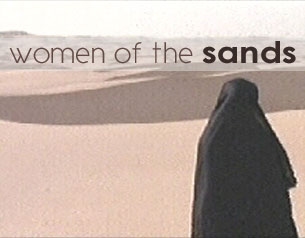Women of the Sands
In this stunning documentary, the nomadic women of Mauritania tell their stories.
 For centuries, nomads have wandered the unforgiving plains of the Sahara, guided by natural beacons and in tune with the desert's cycles. But desertification is threatening their traditional way of life. The Sahara advances by six miles a year, consuming oases, water wells and engulfing whole cities. In this stunning documentary, nomadic women tell their stories. Filmed in a cinema-verite style, it's a poignant study of a vanishing way of life.
For centuries, nomads have wandered the unforgiving plains of the Sahara, guided by natural beacons and in tune with the desert's cycles. But desertification is threatening their traditional way of life. The Sahara advances by six miles a year, consuming oases, water wells and engulfing whole cities. In this stunning documentary, nomadic women tell their stories. Filmed in a cinema-verite style, it's a poignant study of a vanishing way of life.
"Our lifestyle in the desert is completely different from that in the city", states Meilinin. "There we cannot visit people we don't know. In the desert, we can visit whoever we like." Like the other women in her community, she's fiercely independent. She learnt to navigate by the dunes at an early age and enjoys visiting neighbouring communities and meeting new people.
But life in the desert is precarious. "During the rainy season everything is green. Then life is good. Otherwise life is difficult for the young and old", admits Aly. The biggest worry is the encroaching desert. "Desertification is threatening our oasis and the water supply," explains Mariam. Mohamed puts it even more bluntly. "The struggle against desertification is a struggle for survival."
But in this struggle - as in all aspects of community life - women play an active role. "We are trying to build defences against the sand with dead tree branches", says Mariam. She also helps run a small co-operative, growing vegetables and selling surplus products to buy medicine for their children. "Our co-operative doesn't have many means. But through solidarity, we struggle to improve the lives of our community", boasts Zheinabou.
Surprisingly, despite their limited means and isolation, the women keep abreast of new developments. "The technological revolution in all its forms is not a surprise to us," states Fatimetou, typing on a laptop. "We can keep our traditions and lifestyle and still enjoy the advantages of technological developments." More important than electronic gizmos is ensuring their children are properly educated. "Everything depends on education", states Zheinabou. "Education helps us understand the environment in which we live."
Women like Fatimtou believe living in the desert helps to strengthen their Islamic faith. "When I walk in the desert and feel the beauty of nature, I think about the power of God." She's acutely aware of the negative view of Islam in the West and worries about its impact. "The media implies that all Muslims behave like the Taliban but in reality, the status of women is great in Islam."
Whether working in the collective garden, looking after the children or helping the men, there's a quiet sense of fulfilment in all the women do. But they know the future is insecure. Who knows if their children will also be able to live the nomadic life?
FULL SYNOPSIS
